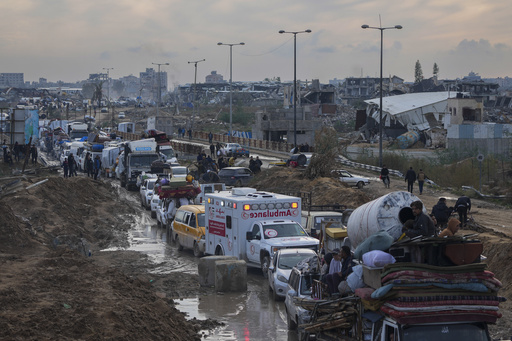
JERUSALEM — On Friday, Hamas announced the names of three Israeli hostages who are set to be released as part of a prisoner exchange over the weekend. This development indicates that the fragile truce in Gaza is still holding amid ongoing tensions that could potentially reignite conflict.
The hostages, who are scheduled to be freed on Saturday, include Iair Horn, 46, an Israeli national from Argentina; Sagui Dekel Chen, 36, an Israeli-American; and Alexander “Sasha” Troufanov, 29, an Israeli-Russian. All three were taken from a community in southern Israel during the Hamas assault on October 7, 2023, which sparked the ongoing war.
As part of the ceasefire arrangement, Israel is expected to release over 300 Palestinian detainees in exchange for the three individuals. This upcoming release marks the sixth exchange since the ceasefire commenced. To date, a total of 21 hostages and more than 730 Palestinian prisoners have been released during the initial phase of the truce. However, recent days have seen the ceasefire on shaky ground, with both parties threatening to resume hostilities.
Hamas had warned of delaying another release, accusing Israel of failing to meet their obligations, such as providing sufficient shelters, medical supplies, fuel, and equipment to clear debris. In turn, Israel has indicated it would recommence military actions unless hostages were freed, leaving ambiguity about whether this pertains specifically to the three hostages or all remaining captives, as urged by U.S. President Donald Trump earlier this week.
An official from the Israeli government confirmed that Israel had received the list of hostages scheduled for release but chose to remain anonymous due to the sensitive nature of the information. The Hamas-affiliated prisoners’ information office indicated that 369 Palestinians are set to be released in the forthcoming exchange, including 36 individuals serving life sentences for serious offenses.
Among those poised for release is Ahmed Barghouti, who has ties to notable Palestinian political figure Marwan Barghouti. Ahmed is serving a life sentence for orchestrating suicide bombings that resulted in the deaths of Israeli civilians during the Second Intifada. He was apprehended alongside Marwan Barghouti in 2002.
The three hostages being released—Horn, Dekel Chen, and Troufanov—were taken from Kibbutz Nir Oz, where around 80 residents were captured during the October 7 attack. Horn was abducted with his brother, Eitan, who remains in captivity. Dekel Chen was working at the kibbutz machine shop during the attack, while his wife, Avital, was forced to hide with their young daughters. Troufanov was taken hostage with his family members but they were released during a previous truce.
Growing concerns over the condition of the remaining hostages have emerged, particularly after the recent release of three individuals whose appearances suggested they had been poorly treated. One such hostage, 65-year-old Keith Siegel, described his suffering during captivity, pleading for help in ensuring the safe return of all remaining hostages.
As the initial phase of the ceasefire approaches its conclusion in early March, there has been little progress in negotiations regarding a potential second phase, which would involve Hamas releasing the remaining hostages in exchange for an end to the conflict.
Residents displaced by the violence continue to express anxiety about potential renewed hostilities, exacerbating their struggle to secure essential resources. Many are concerned that the temporary pause in conflict may not lead to long-term stability. Local charity organizations are providing food to those in need, yet the humanitarian crisis remains severe, with many families driven from their homes left with nothing but rubble upon their return.
The ongoing conflict has claimed the lives of over 48,000 Palestinians, primarily women and children, while Israel contends that it has eliminated over 17,000 militants.
Trump’s proposal to resettle millions of Palestinians from Gaza in other regions threatens to complicate the already tenuous ceasefire arrangement. While the Israeli government has embraced the plan, Palestinians and many surrounding nations have rejected it, viewing it as an unjust proposal that could constitute a war crime.
The Prime Minister’s far-right associates are calling for a resumption of military action aimed at dismantling Hamas in accordance with this controversial plan, which still wields significant influence over the hostages. As the situation continues to evolve, the uncertainty of future negotiations looms large, particularly if Hamas perceives a resumption of warfare as imminent.

